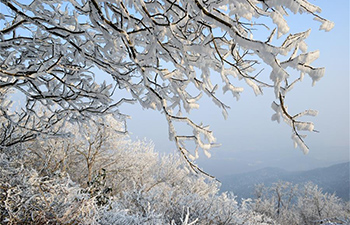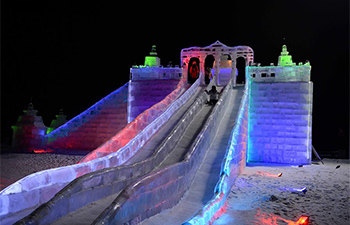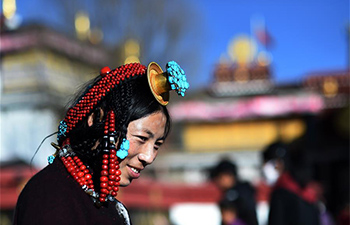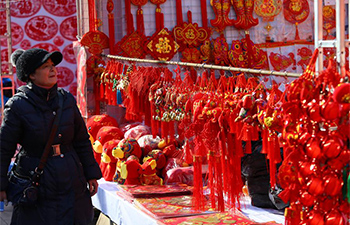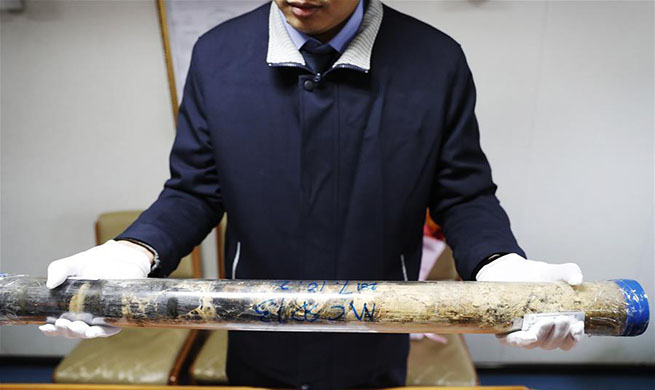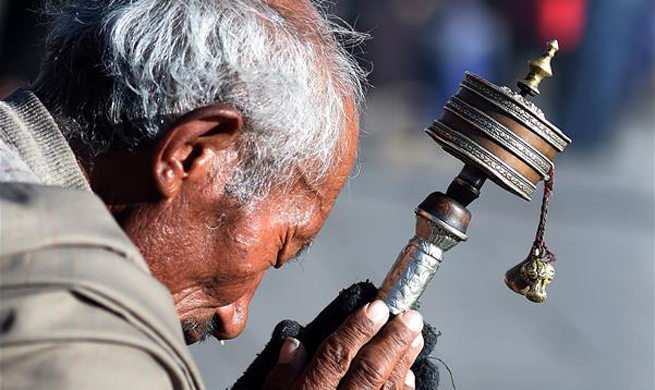URUMQI, Jan. 31 (Xinhua) -- As the sharp sound made by horses stepping on the ice becomes ever louder, their riders dare not to make a sound, while walking along the cliff edge just inches wide at the narrowest.
The only path into the remote Bawzader pasture in Tekes County, Xinjiang Uygur Autonomous Region, is riding along tracks set into cliffs and valleys, known as "the devil's road" by locals.
For years, Elxat and his colleagues have ridden on the dangerous roads to treat the ethnic Kazakh herders living in seclusion in the mountainous pasture.
"Everybody on the road must to obey a golden rule -- the only one you can rely on is your horse. Horses know the roads far better than men," said Elxat, head of the pasture clinic.
He recalled once when he was riding on a sharp curve high on a cliff, he had to keep his eyes closed tight. "I was almost certain that if I looked down, I would fall."
Every time he sets off on a journey, Elxat packs a large bottle of liquor to offer to whoever is scared.
This time, Elxat is travelling with three other doctors. They have to climb three 4,000-meter mountain passes to reach the herders. When riding on the first pass, they saw the body of a cow which had fallen from the cliff and broken its neck.
During the past decade, three people have frozen to death in unexpected blizzards on the pass and many animals have fallen to their death.
Elxat said, in order to reach all the 1,500 households, the doctors make at least three journeys every winter, with each lasting 10 to 20 days. A horse usually loses over 30 kg of weight during each journey.
FOUR DECADES OF PERSEVERANCE
Covering some 2,200 square km, Bawzader, which means "maroon valleys" in Kazakh, is an ideal winter pasture with plenty of sunshine and deep valleys that protect the cattle from the wind. From October to March, thousands of herders make a temporary home there.
The pasture has no tap water, communication signal or internet. The only power supply comes from solar panels. It is almost impossible for herders to make their way to hospital when the snow is heavy.
Back in the 1960s and 1970s, even something like appendicitis could claim the life of a herder.
In 1978, a clinic was set up in the county at the request of the herders. There are now has six seasonal medical stations located around the pasture with a total of eight practitioners.
During the past 40 years, the doctors have persevered with their visits despite many difficulties. "Whatever the herders can endure, we can do as well," said Elxat.
The report from the 19th Communist Party of China National Congress emphasized the importance of a healthy population and stressed improving community-level healthcare services.
Elxat hopes that more doctors will join the clinic and more medical stations will be set up so that the herders can have easier access to medical treatment in the mountains.
FRAGILITY OF LIFE IN MOUNTAINS
On the third day of the journey, the doctors arrived at the home of Ajakber, 61, the oldest herder on the pasture. He walked quickly to the door to welcome them and held their hands in gratitude.
Ajakber had been waiting for the doctors for hours. Without communication devices, the herders inform each other about the arrival of the doctors by shouting.
Ajakber has been grazing his livestock in Bawzader for nearly half a century. In 2006, his wife fell seriously ill. Three neighbors helped him transport his wife to hospital, but they were stranded by a snow storm on a 4,000-meter mountain pass.
Their horses could not move, and the men had to cover the woman in a blanket and drag her through the snow. They finally arrived at the hospital six days later and Ajakber's wife was treated.
As the herders live in harsh conditions and have few vegetables to eat they are plagued by all kinds of illnesses.
Giving birth was previously difficult and often dangerous for female herders. Doctor Zhang Hongying, 43, has delivered over 30 children in the pasture.
She remembered once over ten years ago, she reached a woman at midnight, but could not find a single piece of clean tissue in the home, and had to use wool instead during the delivery.
"With increased awareness, the women now all choose to give birth in hospitals," she said.
Thirteen years ago, Zhang became the only person of Han ethnicity to be registered in the Kazakh village. She could not speak the language and did not know how to ride, but said she now feels like a Kazakh.
"Life is hard here, but I feel needed," she said.





